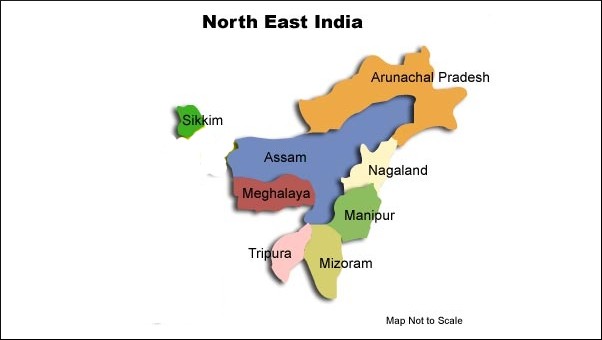
Even though the Bharatiya Janata Party (BJP) hopes to make gains in terms of seats in the upcoming Lok Sabha elections in North East India, emerging realities in the region show that the saffron party's fate mostly depends on the support of it's allies in the region.
The bottom line — if BJP fails to come up with common candidates among it's allies in the north eastern region then gaining more seats might prove challenging for the saffron party.
The Northeastern states in the electoral map rise in importance for the BJP along with few other states in eastern India. After 2014 Lok Sabha elections, the saffron party's dominance in the Hindi heartland had reached it's optimum, leaving hardly any space for further gain in number of seats.
In 2014, BJP had won 71 out of 80 seats in Uttar Pradesh, 26 out of 29 in Madhya Pradesh and 24 out of 25 in Rajasthan.
The party's focus this time around has shifted to the Northeastern states where it aims to improve it's tally up to 21 seats out of 25 in total. Assam BJP leader and finance minister Himanta Biswa Sarma recently claimed that the BJP and it's allies would win 19 to 21 seats in the region out of 25.
BJPs fortune in North East for Lok Sabha elections will rest with allies, partys move to pass Citizenship Bill complicates matters
"There are 25 Lok Sabha seats in the Northeast. I think the BJP and its partners, who are members of the North East Democratic Alliance (NEDA), will win 19-21 seats. In Assam, the BJP and its allies are going to win between 9 and 11 seats," Sarma was quoted as saying by IANS.
The BJP and it's allies had won 11 seats out of 25 in the region in 2014 Lok Sabha polls. But what Sarma failed to mention was that the BJP and it's allies have not arrived at any seat sharing agreement yet in order to avoid division of non-Congress votes.
Increasing the seat tally further in the region would mean winning the seats which remained with the anti-BJP front even during the Modi wave that swept the nation in the year 2014. This would certainly require funnelling of non-Congress votes in favour of one common candidate decided through a seat sharing agreement.
Being well-acquainted with this reality in the region, the BJP stitched an alliance with 11 regional parties in the region making way for a new political front North East Democratic Alliance (NEDA) just after it won a landslide victory in Assam in 2016.
The goal of the new alliance was to make North East 'Congress Mukt', which it met within a period of two and half years. The Mizo National Front a NEDA constituent unseated the Congress government in the region in Mizoram last year.
Interestingly, the BJP also won 60 percent of the Assembly seats it contested through an alliance with the Nationalist Democratic Progressive Party in Nagaland last year and became an integral part of the state government in the Christian state.
The political situation in the region changed dramatically when the saffron party attempted to pass the Citizenship Amendment Bill 2016, which the north easterners believe will open floodgates of illegal immigrants from neighbouring Bangladesh. Two of the allies namely the Asom Gana Parishad and the United Democratic Party pulled out of the North East Democratic Alliance in protest of the bill.
The BJP refrained itself from placing the bill in the Rajya Sabha though it was duly passed in the Lok Sabha, following a threatening by a number of allies of the NEDA to review the alliance.
It is yet to be seen how many of the constituent parties of the NEDA are willing to strike a seat-sharing agreement with the BJP and like to be seen along with it before the election.
The new situation has already cast shadow on the prospects of the BJP and it’s allies in Meghalaya. Many within the state BJP fear that lack of a seat sharing arrangement between the non-Congress front may lead the Congress party win both the Lok Sabha segments in the state.
Sources in the Meghalaya BJP said, "In 2014 Lok Sabha polls the Congress won the Shillong and National People’s Party, an NDA ally won the Tura seat. If the Congress comes up with a powerful candidate in the Tura seat it would be difficult for the non-Congress to retain it in absence of a seat sharing agreement."
Similar fear lurks in Assam too, as one of it’s prime allies Asom Gana Parishad who left the alliance may emerge as a vote cutter party in the upcoming polls.
Though the AGP is hardly left with any political weight now, it was the runners up party in 35 assembly segments in the 2011 Assembly polls and a prime ally of the BJP in the 2016 Assembly polls. No wonder closed door negotiations are on to win the ally back.
The real challenge for the BJP would rest on bringing all it's allies under one umbrella and arriving at a suitable seat-sharing agreement.


.jpeg)

